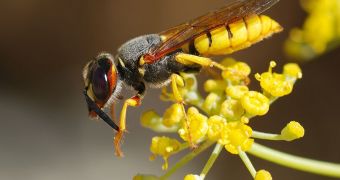A team of investigators announces the discovery of a protection mechanism that a certain type of wasps employs again a species of ants. The two often find themselves in direct competition over the same food sources, and confrontations are never decided easily.
At first, it may seem hilarious that the massive wasps should be scared of the much-smaller ants. That is until people learn that the ants can spray acid onto whoever decides to get in their way.
Despite their larger size, the wasps (Vespula vulgaris) are just as affected by acid as anything else, and are oftentimes forced to flee the native New Zealand ants when they come face to face.
Researchers have noticed this type of behavior on numerous occasions in the past, but recently it was revealed that the wasps may have found a secret weapon of their own. They proved capable of conducting what could be called flybys around the ants, picking them off one by one.
In experiments conducted in the controlled confines of a scientific lab, experts pitted the acid-praying ants against the wasps. While the latter tended to flee at times – in order to avoid contact with the acid – they also exhibited a few moves experts never saw before.
The most impressive of them was when one of the wasps would swoop down from the air, catch one of the ants, and then fly backwards to another location, where it would release the ant mid-flight.
In most cases, the ants that were dispensed with in this manner chose not to return to the “troublesome” food source, and opted instead to search for other food sources. Experts describe their study in the March 30 issue of the esteemed scientific journal Biology Letters.
The new investigation was conducted at the Victoria University in Wellington, New Zealand, and was led by experts Julien Grangier and Philip Lester, Science News reports. They explain that this type of behavior doesn't really make sense to them just now.
Behavioral ecologist Monica Raveret-Richter, from the Skidmore College in Saratoga Springs, New York, agrees. “It's hard to imagine the advantage of removing just one,” she says.
In the new study, the wasps were observed to make the majority of their passes as ants were congregating on top of the food sources. The tactics the wasps apply would make sense if all of the flying insects would attack an ant, removing as much of their competition as possible,
“Perhaps next time I set out baits, I should let some ants join in, and see what happens!” says Raveret-Richter, who conducts research on wasps as well.

 14 DAY TRIAL //
14 DAY TRIAL //